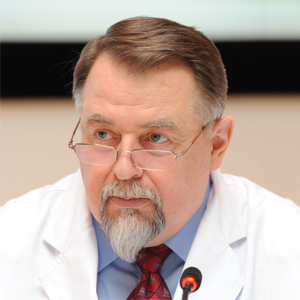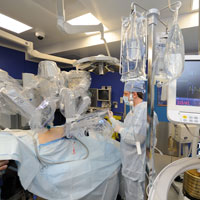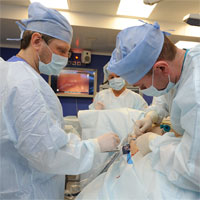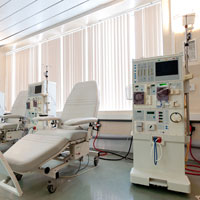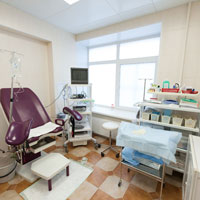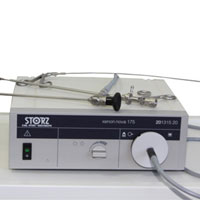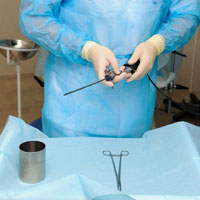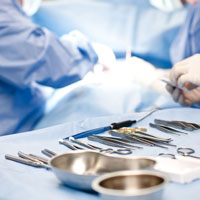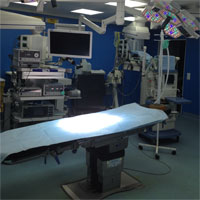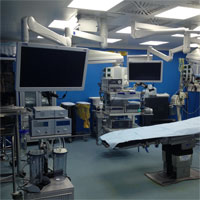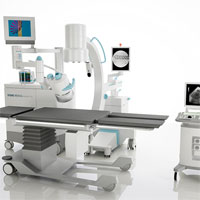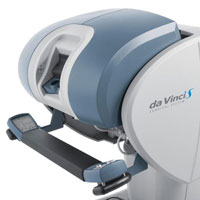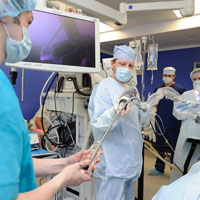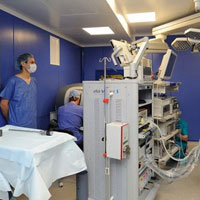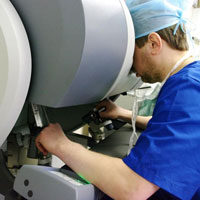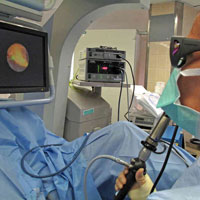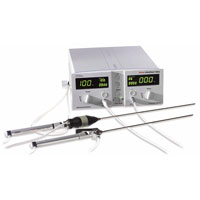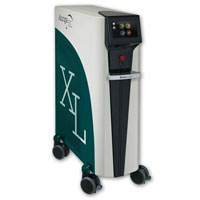Chief of the department: Khanaliev Beniamin Visampashaevich, M.D., Ph.D., urologist, oncologist, professor of the Academic Department of Urology and Nephrology.
In the Department of Urology, as a structural and functional unit of the Pirogov Center presented all modern methods of diagnosis and treatment of urological, oncological, andrological and urogynecological diseases.
Our capabilities
We use only modern standards of diagnosis and treatment. The tactics of treatment in our department are always the choice of the shortest and most effective way of getting rid of the disease.
Our principles
- Awareness. We fully inform patients about the intended use and possible risk of any diagnostic and therapeutic measures. The final cost of time and financial costs will be determined already at the initial consultation.
- Standards of evidence-based medicine. We apply only treatment methods with proven efficacy.
- Minimizing financial costs. We use a step-by-step approach to diagnosing diseases, obtaining maximum information at the first stage, with minimal time and financial costs. Clarifying examination is not shown to all patients, but if necessary, and such a survey can be carried out on the day of treatment. High level of applied technologies allows to achieve maximum results in minimum terms, which also reduces financial and time costs for staying in a medical institution.
Clinical researches
The Department of Urology regularly participates in international multicenter clinical trials of the newest medications, confirming the recognition of the high level of the provision of medical care among the world’s leading clinical centers. Among the main areas — treatment of benign prostatic hyperplasia, erectile dysfunction, hyperactive bladder, inflammatory diseases of the urinary system.
Priorities for the work of the Department of Urology
Urology
- Urolithiasis disease.
- Benign prostatic hyperplasia (BPH).
- Hydronephrosis.
- Nephroptosis.
- Urethral stricture.
- Hypospadias.
- Epispadia.
- Hydrocele.
- Phimosis.
Andrology and Genital Surgery
- Varicocele.
- Premature ejaculation.
- Curvature of the penis.
- Prosthetics of the penis.
- Cryptorchidism.
- Prosthetic testis.
Oncourology
- Kidney Cancer.
- Prostate Cancer.
- Cancer of the bladder.
- Urolithiasis (renal colic).
- Inflammatory diseases of the genitourinary system (pyelonephritis, prostatitis, cystitis).
- Iraumas of the urogenital system.
- Macrogemuria (impurity of blood in urine).
- Acute urinary retention.
- Other emergency urological situations.
Diagnosis of diseases of the genitourinary system
- Ultrasound of the genitourinary system — in the department there is a new device of ultrasound diagnostics of the expert class of Aloka (Japan).
- Excretory urography.
- Multispiral computed tomography.
- Magnetic resonance imaging.
- Urethrography.
- Cystography.
- Cystoscopy.
- Ureteroscopy.
- Uroflowmetry.
- Prostate biopsy.
- Kidney biopsy.
Cystoscopy cabinet
With the help of the latest equipment from Karl Storz, we have the ability to perform instrumental manipulations in the lumen of the urinary system, which often do not require general anesthesia. This allows to carry out:
- Examination of patients in the chair in the position for performing crotch manipulations.
- Gynecological examination of patients.
- Instillation of the bladder.
- Urethroscopy — examination with the help of a special instrument of the lumen and the walls of the urethra.
- Cystoscopy — examination with the help of a special instrument of the lumen and walls of the bladder.
- Stenting of the ureters.
- Removal of ureteral stents (after restoration of conditions for their normal functioning).
- Mechanical cystolithotripsy — fragmentation of bladder stones.
Equipment of the cystoscopic cabinet allows to perform a number of other diagnostic and therapeutic manipulations.
Endourology Operation Room and ESWL (Extracorporeal Shock Wave Lithotripsy)
Is equipped for carrying out a full range of urological and general surgical interventions. It also provides remote lithotripsy on the Modulith SLK hardware complex (Karl Storz, Germany). It allows for remote (non-contact) lithotripsy of kidney and ureter stones, both under
It does not require general anesthesia, the method is non-invasive and minimally traumatic for the patient.
With the help of an
Thus, possible is:
- Fast detection of urinary calculi.
- Monitoring of their fragmentation after a session of remote shock wave lithotripsy.
- Monitoring the course of sclerosing cysts of the kidneys by introducing
X-ray contrast preparations into their cavity. - To check the position of the established ureteral stents, nephrostomy and functional drainage.
- To check the patency and the state of ureteral lumen with the introduction of
X-ray contrast preparations through nephrostomy drainage (in the case, for example, of ureteral strictures).
Innovative technologies
- Since 2008 robotic assisted surgical interventions have been performed using the unique Da Vinci (Intuitive Surgical, USA) hardware complex in the latest Si modification:
- Radical prostatectomy with reconstruction of the urethra in prostate cancer.
- Reconstruction of the tubular ureteral segment with its stricture and / or vasorenal conflict.
- Radical nephrectomy in kidney cancer.
- Resection of the kidney with localized kidney cancer of early stages.
- Excision of sinus cysts of the kidneys.
- Reconstruction of the pelvic ureter in Boari method with its stricture or obliteration.
- A constant practice is to perform remote shock wave lithotripsy of the urinary system with the help of a hardware complex Modulith SLK (Karl Storz, Germany). In combination with contact ureterolithotrypsy this technique allows to treat patients with urolithiasis without open operations and their inherent significant operational injury.
- The use of optical equipment by Karl Storz (Germany) and the combined device for ultrasonic and pneumatic lithotripsy of Swiss LithoClast Master (EMS, Switzerland) have been introduced and widely used since February 2010. A fundamentally new approach made it possible to conduct effective and sparing surgical treatment for patients with large and even coronoid kidney stones.
- Since April 2010, the use of the newest laser system Auriga XL (Wave Light, Germany) has become the main method of endoscopic fragmentation of ureteral stones — contact ureterolithotripsy in the Urology Department. The unique device combines the maximum accuracy in hovering on the calculus, the power of impact on it and the minimal damaging effect on surrounding tissues.
Contact Information
Address: 105203, Moscow, Nizhnyaya Pervomayskaya str., 70
Contact phone number:
Fax:
How to reach us by using public transport
“Pervomaiskaya” metro station (last carriage of the train out of the city centre). From “Pervomaiskaya” metro station by any tram or trolley bus go to the stop “15th Parkovaya Street”. Go along the 15th Park Street to the intersection with the Nizhnyaya Pervomaiskaya Street, turn left and walk about a hundred meters to the entrance of the Pirogov National Medical and Surgical Center.








